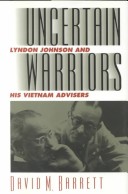Modern War Studies
1 total work
Lyndon Johnson, when it comes to his role in the Vietnam war, is popularly portrayed as an irrational "hawkish" leader who bullied his advisers and refused to solicit a wide range of opinions. That depiction, David Barrett, argues, is simplistic and far from accurate. Johnson zealously worked to shroud his advisory system in secrecy, fearing leaks that might prematurely foreclose his options. The result, says Barrett, is that Johnson appeared to ignore diverse and dissenting opinions, relying instead on a few like-minded advisers. Barrett contends that this insistence on secrecy, plus Johnson's colourful personality, has overshadowed his approach to policymaking and his consideration of a wide spectrum of opinion from a variety of formal and informal advisers. In this book, Barrett presents evidence showing Johnson developed a complex system of consultation. He systematically assesses Johnson's encounters with his advisers and records how the president, the advisers, and outside observers viewed the adviser/advisee relationships.
Following a paper trail of memoranda, letters, diaries and notes, Barrett not only examines how Johnson dealt with his advisers and developed an advisory system, but delves into Johnson's personality and style to show their impact on his decisions. Despite Johnson's willingness to consider opposing viewpoints, Barrett concedes, his rational advisory system nevertheless produced a flawed and fatal set of policies because they were based on an increasingly outdated world view.
Following a paper trail of memoranda, letters, diaries and notes, Barrett not only examines how Johnson dealt with his advisers and developed an advisory system, but delves into Johnson's personality and style to show their impact on his decisions. Despite Johnson's willingness to consider opposing viewpoints, Barrett concedes, his rational advisory system nevertheless produced a flawed and fatal set of policies because they were based on an increasingly outdated world view.
